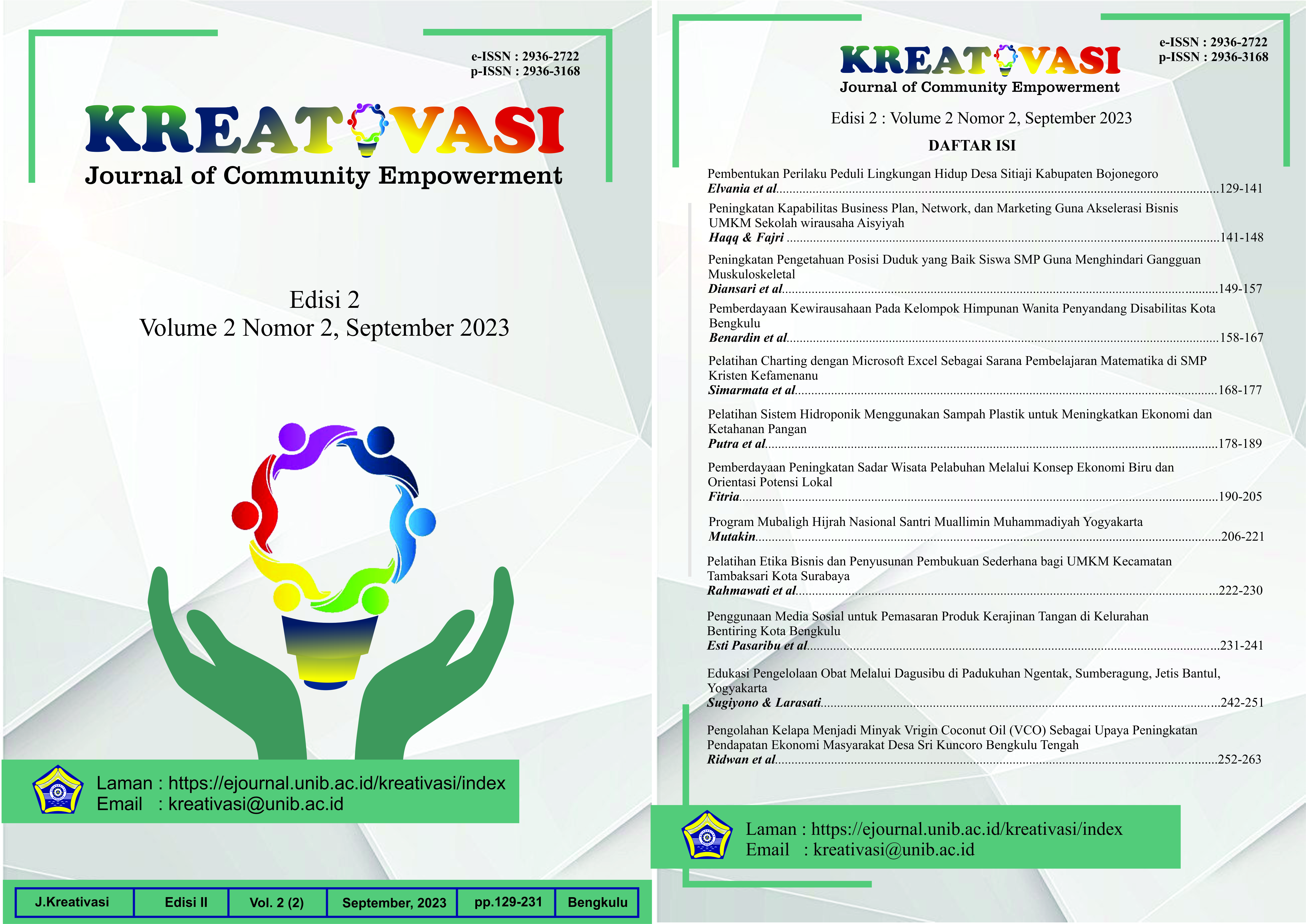Main Article Content
Abstract
The purpose of this community service activity is to provide understanding regarding halal certification, BPOM and tax reporting to fishball business actors in Malingping District. This understanding is specifically related to the benefits obtained when fishball business actors implement the use of halal certification, BPOM and tax reporting. The methods used in community service include 1.) Lectures 2.) Tutorials 3.) Discussions. After this training is completed, fishball business actors can independently take care of halal certification, BPOM and make financial reports for tax compensation needs. The positive and enthusiastic response from the perpetrators of the Malingping Meatball business is an indicator of the success of this activity, and the potential for the Malingping Meatballs business actors is able to support business activities and improve business performance. economic independence from processed foods.
Keywords
Article Details
Copyright (c) 2023 Tri Wahyudi, Refi Pratiwi, Intan Puspanita, Asih Machfuzhoh, Muhamad Fakhrudin, Muhammad Abduh, Galih Ginanjar Saputra

This work is licensed under a Creative Commons Attribution-ShareAlike 4.0 International License.
- This statement is a commitment from the author, to respect copyright, both in terms of quoting the work of others, as well as in the use of journal content.
- If needed, the author can send a statement of authenticity of the manuscript. With the receipt of an article by the Editor of Kreativasi - Journal of Community Empowerment, the article submitted has the copyright held by Kreativasi - Journal of Community Empowerment:
- Kreativasi - Journal of Community Empowerment has the right to reproduce and distribute articles that have been published in journals.
- The author is not permitted to publish the same article that has been published in this journal.
References
- Afroniyati, L. (2014). Political Economy Analysis of Halal Certification by the Indonesian Ulema Council. JKAP (Journal of Public Policy and Administration) , 18 (1), 37–52.
- Faridah, H. (2019). Halal Certification in Indonesia: History, Development, and Implementation. Journal of Halal Products and Research , 2 (2), 68–78.
- Hapsari, A., & Kholis, N. (2020). Analysis of MSME Taxpayer Compliance Factors at KPP Pratama Karanganyar. Indonesian Accounting and Business Review , 4 (1), 56–67.
- Kusnadi, M. (2019). Problems with the Implementation of the Halal Product Guarantee Law in Indonesia. Islamika: Journal of Islam and Education , 1 (2), 116–132.
- Mahariani, YR, & Halim, NIZ-zam. (2022). Improvement of Business Management in MSMEs in Jeli Tulungagung Village. creativity : Journal of Community Empowerment , 1 (September), 72–79. https://doi.org/10.33369/kreativasi.v1i2.23860
- Mintje, MS (2016). The Effect of Attitudes, Awareness, and Knowledge on Compliance of Individual Taxpayers of MSME Owners in Owning NPWP (Study on Individual Taxpayers of MSME Owners Registered at KPP Pratama Manado). , 4(1),. Journal of Economics, Management, Business and Accounting Research , 4 (1), 131–143.
- Palalangan, CA, Pakendek, R., & Tangdialla, LP (2019). The Effect of Taxpayer Perceptions on the Implementation of PP No 23 of 2018, Understanding of Taxation and Tax Sanctions on Compliance with MSME Taxpayers in Makassar. Paul of Journal Accounting , 1 (1).
- Putra, PAA (2017). Position of Halal Certification in the National Legal System as an Effort to Protect Consumers in Islamic Law. Amwaluna: Journal of Islamic Economics and Finance , 1 (1), 150–165.
- Sari, DI (2018). Legal Protection for Halal Food Product Labels According to the Law. Repertorium: Scientific Journal of Notary Law , 7 (1), 1–14.
- Wahyuni, LR, & Purnamawati, IGA (2020). Analysis of Internal and External Factors Affecting MSME Taxpayer Compliance in Buleleng Regency. Scientific Journal of Accounting and Humanics , 10 (3), 381–392.
- Widiyasti, D., Faerrosa, Lady, Dewi, I., Ibrahim, K., & Febriana, W. (2022). Mentoring in Managing Finance and Banking Master's Students Recipient of NTB Scholarships in Malaysia and Poland. creativity : Journal of Community Empowerment , 1 (3), 260–274. https://doi.org/10.33369/kreativasi.v1i3.24196
References
Afroniyati, L. (2014). Political Economy Analysis of Halal Certification by the Indonesian Ulema Council. JKAP (Journal of Public Policy and Administration) , 18 (1), 37–52.
Faridah, H. (2019). Halal Certification in Indonesia: History, Development, and Implementation. Journal of Halal Products and Research , 2 (2), 68–78.
Hapsari, A., & Kholis, N. (2020). Analysis of MSME Taxpayer Compliance Factors at KPP Pratama Karanganyar. Indonesian Accounting and Business Review , 4 (1), 56–67.
Kusnadi, M. (2019). Problems with the Implementation of the Halal Product Guarantee Law in Indonesia. Islamika: Journal of Islam and Education , 1 (2), 116–132.
Mahariani, YR, & Halim, NIZ-zam. (2022). Improvement of Business Management in MSMEs in Jeli Tulungagung Village. creativity : Journal of Community Empowerment , 1 (September), 72–79. https://doi.org/10.33369/kreativasi.v1i2.23860
Mintje, MS (2016). The Effect of Attitudes, Awareness, and Knowledge on Compliance of Individual Taxpayers of MSME Owners in Owning NPWP (Study on Individual Taxpayers of MSME Owners Registered at KPP Pratama Manado). , 4(1),. Journal of Economics, Management, Business and Accounting Research , 4 (1), 131–143.
Palalangan, CA, Pakendek, R., & Tangdialla, LP (2019). The Effect of Taxpayer Perceptions on the Implementation of PP No 23 of 2018, Understanding of Taxation and Tax Sanctions on Compliance with MSME Taxpayers in Makassar. Paul of Journal Accounting , 1 (1).
Putra, PAA (2017). Position of Halal Certification in the National Legal System as an Effort to Protect Consumers in Islamic Law. Amwaluna: Journal of Islamic Economics and Finance , 1 (1), 150–165.
Sari, DI (2018). Legal Protection for Halal Food Product Labels According to the Law. Repertorium: Scientific Journal of Notary Law , 7 (1), 1–14.
Wahyuni, LR, & Purnamawati, IGA (2020). Analysis of Internal and External Factors Affecting MSME Taxpayer Compliance in Buleleng Regency. Scientific Journal of Accounting and Humanics , 10 (3), 381–392.
Widiyasti, D., Faerrosa, Lady, Dewi, I., Ibrahim, K., & Febriana, W. (2022). Mentoring in Managing Finance and Banking Master's Students Recipient of NTB Scholarships in Malaysia and Poland. creativity : Journal of Community Empowerment , 1 (3), 260–274. https://doi.org/10.33369/kreativasi.v1i3.24196
